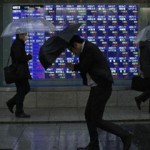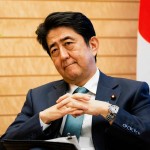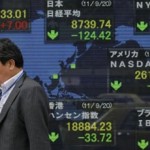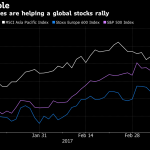Asian Shares Jump With Won After U.S. Payrolls Boost; Oil Falls
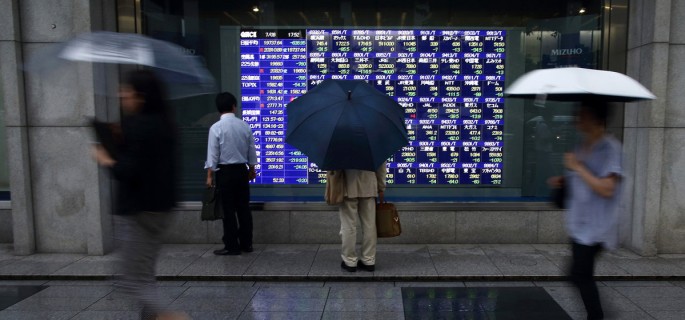
-
Topix jumps by most since February after Abe election victory
-
Won jumps with ringgit after hiring picks up in U.S.
Asia’s stocks and emerging-market currencies rallied, while commodities gained as heightened prospects for stimulus in Japan and better-than-expected U.S. jobs data brightened the global economic outlook. The yen dropped for the first time in a week.
The MSCI Asia Pacific Index rose by the most in four months as U.S. and European equity index futures gained. Japanese shares jumped by the most since February after Prime Minister Shinzo Abe’s ruling coalition won an election, a fresh mandate for him to press ahead with stimulus. South Korea’s won and Malaysia’s ringgit were the best performers among 31 major currencies. Silver climbed to a two-year high, while nickel led gains among industrial metals. Crude fell toward $45 a barrel.

Global equities are almost back to where they were at the time of the U.K.’s June 23 vote to leave the European Union, which wiped almost $4 trillion off the value of the securities. The S&P 500 Index flirted with a record close on Friday as a 287,000-worker jump in nonfarm payrolls damped concern about the health of the U.S. economy without reigniting expectations for the Federal Reserve to raise interest rates this year. Japan’s Nikkei newspaper reported that Abe would on Tuesday order the compilation of a stimulus package.
“The U.S. economy is fine but the outlook for the rest of the world is holding them back from raising rates,” said Mark Matthews, Singapore-based head of Asia research at Bank of Julius Baer. “Abe can do much meaningful fiscal stimulus. The next step is to step up fiscal stimulus in Japan, which could be as simple as writing a check to every household.”
China’s consumer prices gained last month at the slowest pace since January, while factory-gate deflation continued to ease, data showed Sunday. Japan reported a decline in machinery orders on Monday, bolstering the case for more measures to revive Asia’s second-biggest economy. Euro-area finance ministers are due to hold talks in Brussels and Alcoa Inc. is scheduled to kick off the second-quarter earnings season in the U.S.
Stocks
The MSCI Asia Pacific Index climbed 2.2 percent as of 7:16 a.m. London time, with Japan’s Topix index surging 3.8 percent in Tokyo. The win for Abe’s ruling coalition in upper-house elections at the weekend will help the premier press ahead with stimulus and on Sunday he reiterated a pledge to take action. The Bank of Japan is set to announce an expansion of its monthly bond and equity purchases on July 29 and Abe will probably introduce fiscal stimulus by year-end, according to Macquarie Bank Ltd.
Futures on the S&P 500 rose 0.5 percent after the benchmark ended Friday just shy of its highest-ever close and contracts on the Euro Stoxx 50 Index gained 1.1 percent.
“U.S. shares reflected the positive outcome from the payrolls report, and Japanese shares will continue that flow,” said Shoji Hirakawa, chief global strategist at Tokai Tokyo Research Center. “Abe said he’ll continue to put together his economic-policy package, so that optimism is going to continue to support Japanese shares.”
Nintendo Co. soared 25 percent in Tokyo as its new Pokemon Go game topped smartphone app rankings. Panasonic Corp. jumped 7.9 percent after Volkswagen AG was said to be considering partnering electric-car battery specialists such as Panasonic. Taiwan Semiconductor Manufacturing Co., the world’s largest contract maker of microchips, climbed to a record before it reports June sales data on Monday.
Hong Kong’s Hang Seng Index rose by the most this month and the Shanghai Composite Index built on its first back-to-back weekly gains since April. China’s hedge fund managers are turning bullish on stocks with about 76 percent planning to boost stock holdings this month, up from 50 percent in June, according to surveys by Shenzhen Rongzhi Investment Consultant Co.
The Jakarta Composite Index climbed to a 13-month high as Indonesian markets resumed trading after a week-long holiday.
Currencies
The yen slipped 1.3 percent to 101.82 per dollar, after gaining 1.9 percent last week. The won strengthened 1.3 percent, its biggest advance in a month, as the U.S. jobs report spurred demand for emerging-market assets and boosted the outlook for Korean exporters. The ringgit climbed 1.2 percent, the most since March.
The Australian dollar was little changed near a two-week high. After a week of political limbo, Prime Minister Malcolm Turnbull claimed victory in Australia’s July 2 election, though it remains unclear whether his coalition has enough seats to form a majority government. Neighboring New Zealand’s dollar weakened 0.5 percent following a two-day surge of more than 2 percent.
Commodities
The Bloomberg Commodity Index rose 0.5 percent, rebounding from a 3.7 percent weekly loss that marked its steepest slide since January.
Gold fell 0.1 percent, retreating from its highest close since March 2014, and silver advanced 0.8 percent. Copper rose 1 percent, while nickel added 1.8 percent. Corn gained 0.9 percent, rallying for the third day in a row in Chicago since entering a bear market on Wednesday.
Commodities are poised to strengthen in the second half and through 2017 as spending cuts restrain supply and demand continues to grow at a moderate pace, according to Citigroup Inc. The bank is “especially bullish” for next year as inventory reductions become more pronounced, analysts led by Ed Morse said in an e-mailed note received Monday.
West Texas Intermediate crude fell 0.7 percent to $45.10 a barrel, after tumbling 7.3 percent last week. Crude resumed losses after data from Baker Hughes Inc. showed U.S. drillers boosted the number of rigs targeting oil to the highest in 12 weeks.
“When those rig numbers are up, we will see weakness in the oil price because it will bring on new supply,” said David Lennox, an analyst at Fat Prophets in Sydney. “Anything where it shows that supply is potentially able to come back on-stream will cause constant problems.”
Bonds
U.S. Treasuries due in a decade fell, lifting their yield by two basis points to 1.38 percent. Similar-maturity debt in Japan yielded minus 0.28 percent, after the rate touched an all-time low of minus 0.30 percent on Friday.
Japan’s biggest bond bulls say the plunge in yields below zero in Tokyo foreshadows record-breaking gains for U.S. Treasuries. Mitsubishi UFJ Kokusai Asset Management says U.S. 10-year yields will drop to 1 percent as soon as this month, having touched an unprecedented 1.32 percent last week. Sumitomo Mitsui Trust Asset Management says it’s likely in 2017, and Mizuho Asset Management predicts the figure may go even lower.
“Welcome to the world of Japanification,” said Hideo Shimomura, the chief fund investor at Mitsubishi UFJ Kokusai in Tokyo, which oversees about $119 billion. “One percent is inevitable.”
Futures put the odds of a Fed rate increase this year at 21 percent, up from 12 percent before Friday’s payrolls figures.
Source: Bloomberg










